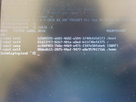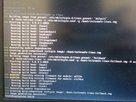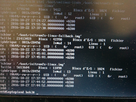You are not logged in.
- Topics: Active | Unanswered
#1 2016-10-27 12:54:00
- Bmdntg
- Member

- Registered: 2016-10-11
- Posts: 34
modprobe looking in wrong /lib/modules folder
Hi
I'm having a weird issue since last update/upgrade
I could not connect to neither wifi or ethernet despite the modules loading so I did a reboot and now I'm trying to modprobe ath9k :
modprobe: FATAL: Module ath9k not found in directory /lib/modules/4.7.6-1-ARCHIn my/lib/modules/ there is 4.8.3-1-ARCH and extramodules-4.8-ARCH
So why modprobe is looking for a previous version ?
Offline
#2 2016-10-27 13:05:37
- Lone_Wolf
- Administrator

- From: Netherlands, Europe
- Registered: 2005-10-04
- Posts: 14,670
Re: modprobe looking in wrong /lib/modules folder
compare uname -a and pacman -Q linux output .
If they don't show the same kernel version, the kernel in your initramfs is older/different from the installed kernel .
Disliking systemd intensely, but not satisfied with alternatives so focusing on taming systemd.
clean chroot building not flexible enough ?
Try clean chroot manager by graysky
Offline
#3 2016-10-27 13:14:33
- Bmdntg
- Member

- Registered: 2016-10-11
- Posts: 34
Re: modprobe looking in wrong /lib/modules folder
uname -a and pacman -Q linux show different versions as predicted, should I mkinitcpio -p linux again ?
Offline
#4 2016-10-27 13:17:52
- Lone_Wolf
- Administrator

- From: Netherlands, Europe
- Registered: 2005-10-04
- Posts: 14,670
Re: modprobe looking in wrong /lib/modules folder
yes, but verify first if your /boot is mounted ,
Disliking systemd intensely, but not satisfied with alternatives so focusing on taming systemd.
clean chroot building not flexible enough ?
Try clean chroot manager by graysky
Offline
#5 2016-10-27 13:30:00
- Bmdntg
- Member

- Registered: 2016-10-11
- Posts: 34
Re: modprobe looking in wrong /lib/modules folder
I did it and /boot was mounted but when I reboot I'm still on 4.7.6-1, what did I forget ?
Offline
#6 2016-10-27 13:36:32
- Lone_Wolf
- Administrator

- From: Netherlands, Europe
- Registered: 2005-10-04
- Posts: 14,670
Re: modprobe looking in wrong /lib/modules folder
post lsblk -f & "mkinitcpio -p linux" output .
What bootloader are you using, is this a bios or uefi booting system ?
Last edited by Lone_Wolf (2016-10-27 13:37:17)
Disliking systemd intensely, but not satisfied with alternatives so focusing on taming systemd.
clean chroot building not flexible enough ?
Try clean chroot manager by graysky
Offline
#7 2016-10-27 13:37:23
- seth
- Member

- From: Don't DM me only for attention
- Registered: 2012-09-03
- Posts: 72,373
Re: modprobe looking in wrong /lib/modules folder
What's the
mkinitcpio -p linux
stat /boot/vmlinuz-linux /boot/initramfs-linux*output?
Offline
#9 2016-10-27 14:14:04
- seth
- Member

- From: Don't DM me only for attention
- Registered: 2012-09-03
- Posts: 72,373
Re: modprobe looking in wrong /lib/modules folder
In general, please refrain from sscreenshots.
Unless your update was 7 days ago, vmlinuz-linux is most likely outdated.
Ensure /boot to be mounted and re-install the "linux" package.
Offline
#10 2016-10-27 15:26:32
- Bmdntg
- Member

- Registered: 2016-10-11
- Posts: 34
Re: modprobe looking in wrong /lib/modules folder
I chrooted and updated the packages (including linux) but after a reboot it is still 4.7.6-1 ...
Offline
#11 2016-10-27 15:30:37
- seth
- Member

- From: Don't DM me only for attention
- Registered: 2012-09-03
- Posts: 72,373
Re: modprobe looking in wrong /lib/modules folder
chrooted? is 4.7.6-1 from booting eg. the install iso or from booting the installED system?
Offline
#12 2016-10-27 15:34:33
- V1del
- Forum Moderator

- Registered: 2012-10-16
- Posts: 24,995
Re: modprobe looking in wrong /lib/modules folder
Where does your bootloader point to, what does its configuration look like? My wild guess would be you now have a /boot directory where your old kernel is, that gets opened and started by GRUB or whatever then your old kernel loads mounts the boot partition with your new kernel on but that's already too late of course.
Offline
#13 2016-10-27 18:57:32
- Bmdntg
- Member

- Registered: 2016-10-11
- Posts: 34
Re: modprobe looking in wrong /lib/modules folder
Here is my GRUB.cfg : https://paste.pound-python.org/show/Oo9 … 087kfiD4G/
Offline
#14 2016-10-27 19:41:02
- Bmdntg
- Member

- Registered: 2016-10-11
- Posts: 34
Re: modprobe looking in wrong /lib/modules folder
I just rebuilt grub with grub-mkconfig -o /boot/grub/grub.cfg but it did nothing, still on 4.7.6-1 after reboot.
Offline
#15 2016-10-28 05:22:48
- smirky
- Member

- From: Bulgaria
- Registered: 2013-02-23
- Posts: 277
- Website
Re: modprobe looking in wrong /lib/modules folder
Check if you umount /boot and there are files in /boot after that.
Check if you have /EFI /efi /boot/EFI /boot/efi directories and if there's any of those, list the contents here.
This kernel booted from somewhere and you should know best from where.
Do you have additional hard drives or SSDs?
/etc/fstab ?
Last edited by smirky (2016-10-28 05:23:45)
Personal spot :: https://www.smirky.net/ :: Try not to get lost!
Offline
#16 2016-10-28 07:35:09
- seth
- Member

- From: Don't DM me only for attention
- Registered: 2012-09-03
- Posts: 72,373
Re: modprobe looking in wrong /lib/modules folder
Direct test: "sudo mv /boot/initramfs-linux-fallback.img /boot/not-the-initramfs-linux-fallback.img", then reboot and select the failsafe variant. If that just boots, you're not booting whatever is listed in mounted /boot ;-)
Offline
#17 2016-10-28 09:10:32
- Bmdntg
- Member

- Registered: 2016-10-11
- Posts: 34
Re: modprobe looking in wrong /lib/modules folder
So I just checked /boot with /boot partition unmounted and there are the usual boot files, so do I need only to remove them from / partition ?
(I am booting what's in/boot on the root partition, not on /boot partition)
Last edited by Bmdntg (2016-10-28 09:28:31)
Offline
#18 2016-10-28 11:22:46
- smirky
- Member

- From: Bulgaria
- Registered: 2013-02-23
- Posts: 277
- Website
Re: modprobe looking in wrong /lib/modules folder
Well, you should remove them, yes.
But that doesn't really guarantee that you'll boot from your /boot partition the next time.
If it's not a problem for you to test, then do it. Otherwise, cat /etc/fstab
Personal spot :: https://www.smirky.net/ :: Try not to get lost!
Offline
#19 2016-10-28 11:29:55
- Bmdntg
- Member

- Registered: 2016-10-11
- Posts: 34
Re: modprobe looking in wrong /lib/modules folder
This is my fstab : https://paste.pound-python.org/show/A5I … 56HVxrUX7/
I removed all the files in /boot/ and now GRUB enters rescue mode.
Last edited by Bmdntg (2016-10-28 11:34:09)
Offline
#20 2016-10-28 11:33:40
- smirky
- Member

- From: Bulgaria
- Registered: 2013-02-23
- Posts: 277
- Website
Re: modprobe looking in wrong /lib/modules folder
Then reboot...
Personal spot :: https://www.smirky.net/ :: Try not to get lost!
Offline
#21 2016-10-28 11:44:09
- smirky
- Member

- From: Bulgaria
- Registered: 2013-02-23
- Posts: 277
- Website
Re: modprobe looking in wrong /lib/modules folder
Then do grub-install -o /boot/grub/grub.cfg or whatever guide you followed to install grub to re-configure the bootloader.
Personal spot :: https://www.smirky.net/ :: Try not to get lost!
Offline
#22 2016-10-28 12:08:05
- Lone_Wolf
- Administrator

- From: Netherlands, Europe
- Registered: 2005-10-04
- Posts: 14,670
Re: modprobe looking in wrong /lib/modules folder
your fstab matches the lslbk output, but in the grub cfg you posted a UUID is used that doesn't even occur in lsblk/fstab !
If smirky's suggestions don't help:
boot from liveiso, chroot , remove grub .
exit chroot
erase boot partition and recreate it .
check the installation guide and follow the instructions to setup boot partition & bootloader.
Disliking systemd intensely, but not satisfied with alternatives so focusing on taming systemd.
clean chroot building not flexible enough ?
Try clean chroot manager by graysky
Offline
#23 2016-10-28 12:11:32
- Bmdntg
- Member

- Registered: 2016-10-11
- Posts: 34
Re: modprobe looking in wrong /lib/modules folder
I did reconfigure with grub-mkconfig but again, I'm still on rescue, there is something I do wrong, it has to do with /boot and /boot/ I think...
Offline
#24 2017-02-02 17:47:46
- Bmdntg
- Member

- Registered: 2016-10-11
- Posts: 34
Re: modprobe looking in wrong /lib/modules folder
Ok, back to it after several month of letting the laptop in a closet, I did reformat /boot partition, (mkfs), relabel fstab, install linux-lts and now that I try to reinstall grub with
grub-install --target=i386-pc /dev/sdb1I encounter another issue :
grub-install: error: cannot find a GRUB drive for /dev/sdb1. Check your device.map, I don't know where I messed up again.
Edit : I tried to grub-install on sdb1 instead of sdb
Last edited by Bmdntg (2017-02-02 17:56:33)
Offline
#25 2017-02-02 17:59:38
- Bmdntg
- Member

- Registered: 2016-10-11
- Posts: 34
Re: modprobe looking in wrong /lib/modules folder
I did a reboot and now I have a timed out device, dependency failed for boot, local file system and file system check...
Offline


